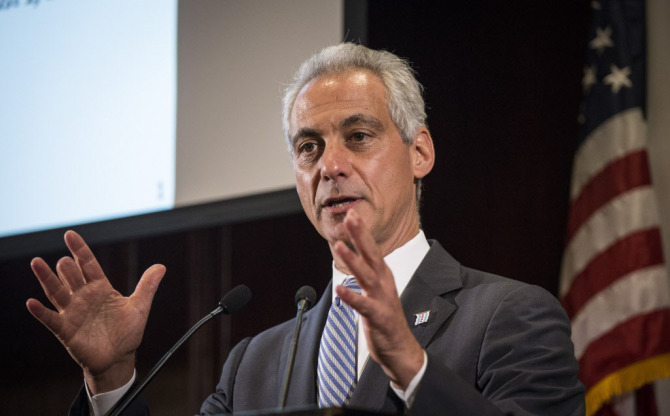(Mayor Rahm Emanuel speaks at the City Club of Chicago | Rich Hein/Sun-Times
The new agency charged with investigating police wrongdoing will be called the Civilian Office on Police Accountability, aldermen were told Monday as they haggled with the mayor’s office over final language.
Ald. Scott Waguespack (32nd), leader of the City Council’s Progressive Caucus, said he was generally pleased with the draft ordinance he was shown Monday. But there are several points of contention.
COPA, the new agency that will take the place of the soon-to-be-abolished Independent Police Review Authority (IPRA), will not have the authority to hire its own independent counsel, Waguespack said.
Nor would the new agency have a guaranteed percentage of the city budget to prevent the new COPA chief from going hat-in-hand to the mayor and City Council for additional resources, Waguespack said.
The new inspector general in charge of public safety would be chosen by Inspector General Joe Ferguson after a process that includes a nationwide search, the alderman said.
But the new IG would also will not be guaranteed additional resources beyond the guaranteed .01 percent of the overall city budget it already receives.
Most troubling to Waguespack is the outside counsel issue.
“The Law Department wants to be able to control expenditures and how those lawyers would be chosen. They won’t budge on that. That’s a problem,” Waguespack said Monday.
“There could be a limit on it. But when there’s conflict of interest, you need to have two separate bodies of representation. The Law Department represents police officers. There should be a firewall between the Law Department and COPA in any instances where there might be a conflict, sharing information or having to work with people in the department representing different sides of the same issue.”
Still, Waguespack called Mayor Rahm Emanuel’s ordinance a “decent start” with the “core fundamentals worked out pretty well.”
“There’s been enough experience out there with what IPRA did wrong and what other cities have done right to change the systems to make them work. New York is a good model. They’ve taken that to heart,” he said.
But Waguespack urged the mayor not to try to rush the ordinance through the City Council on Sept. 14.
“We’d like to take it back to community members and organizations involved in taking many months of researching it and work through the legislative process so it’s open and inclusive,” he said.
“Two weeks is not enough time for interaction with all the concerned parties. If this is something acceptable to a lot of people out there, it probably will be enough to win back public trust,” Waguespack said. “But we need time.”
Mayoral spokesman Adam Collins had no immediate comment on Waguespack’s demand for the mayor to postpone the Sept. 14 vote.
He would only say that Emanuel has been working closely with the City Council’s Budget and Public Safety Committees and the Progressive Caucus for “upwards of a year” that has included “more than a dozen public hearings and countless meetings.”
“There was another productive meeting [Monday] to gather feedback from a working group of aldermen on an ordinance to replace IPRA and create a public safety inspector general while we have additional opportunities for public input on the creation of a civilian oversight board,” Collins wrote in an email. “With all the input we have received we expect to have a final ordinance to share in the very near future.”
Ald. Joe Moore (49th) joined in the call for Emanuel to push back the Sept. 14 vote.
“I’m more concerned about the optics than anything else,” Moore said, noting that Emanuel’s current plan is for a committee vote on Sept. 13 and a final vote the following day. “It’s important that we not give the impression that we’re rushing this through.”
The agency that replaces IPRA would be empowered to investigate Taser usage as well as police shootings.
Retired police officers and prosecutors would have to wait five years before applying for jobs as COPA investigators.
The police superintendent would have 60 days to respond to the new agency’s recommendations for firing or suspension of wayward police officers with the possibility for a 30-day extension, under the mayor’s plan.
The Chicago Sun-Times reported last week that IPRA chief Sharon Fairley would likely be asked to stay on for months — even after the agency is abolished — to ensure the continuity of investigations of police wrongdoing.
That’s because Emanuel had decided to forge ahead with replacing IPRA and appointing an inspector general to oversee public safety but to go slowly on a civilian oversight board to garner more community input.
Since that oversight board would be responsible for choosing the new chief of the agency that replaces IPRA, but the oversight board won’t be constituted for months, Fairley will likely be asked to stay on.
Testifying last week at the final subject matter hearing on police accountability, Fairley made the case for hiring their own outside attorneys instead of relying on a Law Department that negotiates the police contract and defends police officers in federal court.
Fairley also maintained that it is essential to give the replacement agency a fixed percentage of the city budget.
“If the person who’s giving me the resources is asking me to do something, that creates a conflict,” she told aldermen.
In early May, Emanuel did an abrupt about-face in a desperate attempt to restore public confidence shaken by his handling of the Laquan McDonald shooting video.
After saying he wanted to wait for direction from the U.S. Department of Justice’s civil rights investigation of the Chicago Police Department, Emanuel forged ahead and embraced the most controversial and far-reaching changes proposed by his handpicked Task Force on Police Accountability.
He said he would replace IPRA with a more independent civilian agency; appoint a public safety inspector general to monitor the police department; and create a Community Safety Oversight Board to monitor all police-related operations.
But the logistics of that broad-strokes plan were left blank.
IPRA was created less than a decade ago by then-Mayor Richard M. Daley in the wake of scandals that included systemic torture of crime suspects by detectives working under Cmdr. Jon Burge and the videotaped drunken beating by Officer Anthony Abbate of a female bartender.
The agency had investigated more than 400 police shootings by late last year and ruled all but two of those shootings justified. In both cases, the shooters were off-duty police officers. More recently, IPRA has gotten a whole lot tougher.







